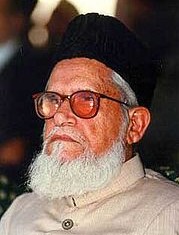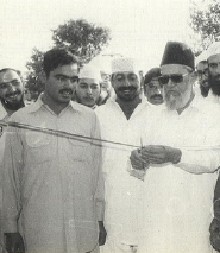Kashif Hafeez Siddiqui
 Veteran Pakistani politician and eminent Islamic scholar Mian Tufail Mohammad passed away on Friday 25th June 2009 at the age of 95. For fifteen years, during the period 1972-1987, Mian Tufail Mohammad served as the Ameer (Leader) of Jamaat-e-Islami, Pakistan. He was the second Ameer of the party, following the founder of the Jamaat, Abul Ala Maududi.
Veteran Pakistani politician and eminent Islamic scholar Mian Tufail Mohammad passed away on Friday 25th June 2009 at the age of 95. For fifteen years, during the period 1972-1987, Mian Tufail Mohammad served as the Ameer (Leader) of Jamaat-e-Islami, Pakistan. He was the second Ameer of the party, following the founder of the Jamaat, Abul Ala Maududi.
Mian Sahib was born in 1914 in Kapurthala district Jalandhar, East Punjab in a farmer’s family. He was the only brother of eight sisters. His parents wanted him to be an educated person and in 1935, at the age of 21, he received his B.A. (Hons) in Physics and Mathematics from Government College, Lahore, with distinction. Later, in 1937, he completed his law degree (LL.B.; specializing in witness and land laws) in 1937 from the University Law College, Lahore securing second position.
He started his career as a lawyer, working as junior to Justice Mohammad Sharif in 1938 in Julandhar, but moved to his native town Kapurthala after one year. He was the first Muslim lawyer from this princely state. In 1942 Mian Sahib got married, and he was father to 8 daughters and 4 sons; all now married and settled in Pakistan.
In the late 1940s he encountered the workss of Maulana Syed Abul Aala Maududi and, on the advice of Syed Ata Ullah Shah Bukhari, he met and became close to Maulana Maududi. When the Jamat-e-Islami was formed as a religious political party on August 26, 1941, Mian Tufail Muhammad was one of its 75 founding members.
He left the legal profession in 1942 and joined a business house of his relatives in Lahore. His zeal for the Jamaat-e-Islami movement soon made him rise in the ranks of the party and in the All India Convention (Ijtima) of the Jama’at e Islami, in March, 1944, he was appointed the first permanent Secretary General (Qayyam) of the party. He immediately abandoned his business and moved to Darussalam in Pathankot, East Punjab. From that moment on he was always in company of and a close confidant of Syed Maududi. Except for the periods when he was put in jail, he worked as Secretary General of the Jama’at till 1965. From January 1966 to 1972 he was Ameer of Jamaat-e-Islami West Pakistan. In between, he also assumed the position of Ameer-e-Jama’at of Pakistan when the occasion so demanded, particularly when Maulana Maududi was ill or was in jail and or on leave.
 When Maulana Maududi resigned as Ameer-e-Jama’at in October 1972, for health reasons, Mian Tufail Mohammad was elected as Ameer for five years. He was also elected for two more terms. In 1987 he declined further service in the office because of his long ailment. Consequently Qazi Hussain Ahmad was elected to the top position. Mian Sahib confined himself to research work and joined Idara e Ma’arif e Islamia (Islamic Research Academy) in Mansoora, Lahore.
When Maulana Maududi resigned as Ameer-e-Jama’at in October 1972, for health reasons, Mian Tufail Mohammad was elected as Ameer for five years. He was also elected for two more terms. In 1987 he declined further service in the office because of his long ailment. Consequently Qazi Hussain Ahmad was elected to the top position. Mian Sahib confined himself to research work and joined Idara e Ma’arif e Islamia (Islamic Research Academy) in Mansoora, Lahore.
On several occasions he was invited by world leaders such as Gamal Abdul Nasser (President of Egypt) to advise on political conflicts and mediate with Ikhwanul Muslamoon (Muslim brotherhood) as he was widely respected. He also led the first delegation of Muslim World Leaders to Tehran after the formation of the Islamic government there. At that time, Pakistan was the first country to recognize the new Iranian regime after the fall of Shah of Iran. Imam Khomeni presented him with a specially engraved marble Quran. This Quran was originally a special gift from the then President of the Palestinian Liberation Organization (PLO) Yasser Arafat presented to Imam Khomeni.
Although Mian Tufail’s political responsibilities took time away from his literary activities, some of his works are widely hailed. The Urdu rendition of Kashaf-ul-Mahjub and Dawat-e-Islami and Its Demands’ (Urdu) co-authored with Maulana Maududi and Maulana Amin Ahsan Islahi, are the prominent pieces. His articles and interviews to press are numerous and cover most scholarly and political topics.
The strong organizational structure of today’s Jamaat e Islami owes much to Mian Sahib. Some may disagree with his political ideology, especially his soft tilt as a strategy to achieve high goals towards Gen. Zia-ul-Haq military government. For this he was criticized both within and outside Jamaat circles. But his personal sincerity, dedication and piety were widely respected. As Secretary General and then Ameer of the Jamaat, he has reportedly given preference on character building over political activism. Even the opponents of his policies and party acknowledge their respect for his person.
May Allah rest Mian Tufail’s soul in peace.
Kashif Hafeez Siddiqui writes from the Daily Ummat and runs his own blogs in both Urdu and English.




















































I find the comments on this far more interesting than the post. Shows once again what a divided society we are. Poor ATP, trying to portray “ALL THINGS” Pakistan and being beaten up by extremists on both sides :-)
Too bad that some people think that the intolerance of others is to become intolerant oneself :-)
Even if the idea was to focus on someone whose brainchild had an impact (all bad) on Pakistan’s politics, why publish something that is so clearly biased in his favor? Such pieces really belong in Nawa-e-Waqt…
And are all columnists in Pakistan bound by some kind of law to append “Sahib” at the end of all Jamaati leaders?
Mian Sahib and Qazi Sahib and now Syed Sahib… my foot…
I think supporting dictators in Pakistan is a famous practice of our politicians. When JI was campaigning against Ayub Khan, a military dictator, in favour of democracy and basic rights with moderate parties, Z .A. Bhutto was making headlines as a famous cabinet minister of Ayub Khan. No Pakistani of that time can forget the famous couple of Daddy (Ayub Khan) and Zulfi (Z. A. Bhutto). Similarly, not only Mian Tufail but Navaz Sharif, Javed Hashmi, Yousuf Raza Gilani and Shah Mehmood Qureshi etc, also openly and fully supported Zia. Mian Tufail never raised the slogan of democracy, though he struggled for it even with Fatima Jinnah against Ayub, as he only wanted to see Pakistan a true Islamic welfare state but why those who are now and were the champions of democracy supported dictators? Why should not Zulfi, Nawaz Sharif and Imran Khan (the ex-supporter of Musharraf) be blamed for their pro-dictatorship acts as all of them always liked to introduce themselves as father of democracy? Why the mother of democracy in Pakistan, Benazir Bhutto, agreed upon a notorious deal with Musharraf, which paved the way of NRO. I belief, the qualities which makes Mian Tufail different from all the above mentioned politicians was his modesty, honesty and poverty. He always preferred to stay in a small house and never make even a corruption of one paisa in his forty years long political career.
@Being an ex MQM supporter I never got agreed with IJT’s politics but I got to know about Mian Tufail when I read Kashful Mahjoob which he translated when he was in jail which is really a wonderful piece of work which made me to tribute the person on my blog as well.
I did get surprise to read Kashif Hafeez on ATP. It would be really a “day of mourning” for a Kashif “fan” on ATP. :P
The responses of few people who equate Mian Tufail with Baitullah and other just proves that ‘ignorance is really bliss’ and its nto only Talibans but few “psuedo intellectual” Talibans also blessed with it.
Congratulations ATP for bowing down to pressure from the extremists and publishing this post. The post on Michael Jackson is now legit in their eyes. Now I also demand a post for each and every politician who has done irreversible damage to Jinnah’s Pakistan and while you’re at it, throw in a post or two on all the anti-Pakistan politicians pre & post independence. That should cover all the bad guys. Remember the rules…as long as you can associate Pakistan’s name with them.. :-)